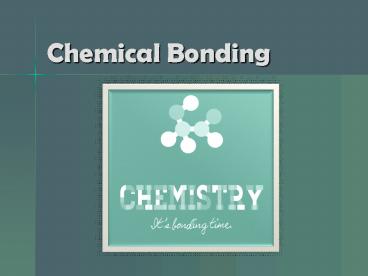Chemical Bonding - PowerPoint PPT Presentation
1 / 21
Title:
Chemical Bonding
Description:
Chemical Bonding Chemical Bonding: Electrical attraction between nuclei of one atom and valence electrons of a different atom Why does bonding occur? – PowerPoint PPT presentation
Number of Views:219
Avg rating:3.0/5.0
Title: Chemical Bonding
1
Chemical Bonding
2
Chemical Bonding
- Electrical attraction between nuclei of one atom
and valence electrons of a different atom - Why does bonding occur?
3
Ionic Bonds
- Bond most often between a metal and a nonmetal
- Transfer of electrons from the metal to the
nonmetal - Electrical attraction between large numbers of
cations and anions called clusters - Ion a charged particle
4
Ionic Bonds
- Cation charged particle
- Loves to give electrons away
- Low Ionization Energy, Electron Affinity
Electronegativity - Typically are metals
- Most metallic element Fr
5
Ionic Bonds (cont.)
- Anion - charged particle
- Loves to accept electrons
- High Ionization Energy, Electron Affinity
Electronegativity - Typically are nonmetals
- Most nonmetallic element F
6
Ionic bonding
- Ionic bonding involves 3 steps (3 energies)
- 1) loss of an electron(s) by one element,
- 2) gain of electron(s) by a second element,
- 3) attraction between positive and negative
3)
7
Ionic Bonds (cont.)
- Ionic compounds are solids (salts)
- Ionic bonds dissociate in water
- Fall apart into cations and anions
- Will conduct electricity
- --EN values 1.8 up to 4
8
In General. Ionic Bonds are the strongest
bonds there are!
9
Covalent Bonds
- Formed when 2 nonmetal atoms share electrons
- Can be liquid, solid or gas
10
Polar Covalent Bonds
- Unequal sharing of electrons
- Electrons attracted more to higher E.N. atom so
density is greater around atom with higher E.N.
value - Electronegativity difference range 0.3 1.7
(for polar covalent bonds) - Polar Covalent Bonds dissolve in water
- Dont fall apart into ions
- No conductivity
11
Non-polar Covalent Bonds
- Equal sharing of electrons
- Electronegativity difference range 0.0 lt0.3
- Usually found between diatomic molecules two of
the same atoms - Non-polar covalent bonds dont dissolve in water.
- No conductivity
12
Metallic Bonds
- Bond formed between 2 metal atoms.
- Large outer electron shells which overlap
- Excellent electrical conductors in solid state
- Electrons are free to move within electron clouds
of all metal ions Sea of Electrons
13
Metallic Bonds
- In metals, p-orbitals and some d-orbitals are
completely vacant and overlap each atom. - Electrons are delocalized they dont belong to
any one atom anymore.
14
Quick Review
- Ionic bonds are between
- A) metals and non-metals
- B) non-metals
- C) metals
- Answer A) metals and non-metals
15
Quick Review
- Covalent bonds are between
- A) metals and non-metals
- B) non-metals
- C) metals
- Answer B) non-metals
16
Quick Review
- Metallic bonds are between
- A) metals and non-metals
- B) non-metals
- C) metals
- Answer C) metals
17
Quick Review
- The strongest bonds are between
- A) metals and non-metals
- B) non-metals
- C) metals
- Answer A) metals and non-metals (ionic)
18
Quick Review
- Ionic bonds at room temperature are
- A) solid
- B) liquid
- C) gas
- D) any
- Answer A) solid
- Can you name some?
19
Quick Review
- Covalent bonds at room temperature are
- A) solid
- B) liquid
- C) gas
- D) any
- Answer D) any
- Can you name some?
- HCl (aq), Bromine (aq), Fluorine (g), Diamond (s)
20
Quick Review
- Metallic bonds at room temperature are
- A) solid
- B) liquid
- C) gas
- D) any
- Answer A) solid and B) liquid
- What metallic bonds can be liquid at room
temperature? - Hg Any ideas why?
- Bond strength not enough to make a solid yet
strong enough to keep it from being a gas.
21
Quick Review
- Which bonds are most likely to dissociate in
water (water is polar) - A) ionic
- B) polar covalent
- C) nonpolar covalent
- D) Metallic
- Answer A) ionic































